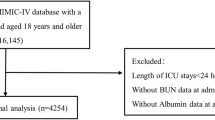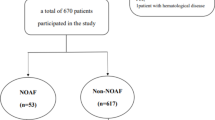Abstract
The primary study aim was to determine whether ischemia-modified albumin (IMA) predicts adverse outcome in patients attending the emergency department (ED) with acute chest pain. Ischemia-modified albumin is a sensitive marker of myocardial ischemia. However, little is known about its ability to predict outcome in patients presenting to the ED with acute chest pain. We prospectively studied 207 patients who presented to the ED with acute chest pain suggestive of acute coronary syndrome within 3 h of the onset of symptoms. Blood samples for IMA assessment were obtained on admission. We evaluated a 30-day combined end point (cardiac death, myocardial infarction, recurrent angina) and 1-year all-cause mortality. A total of 31 (15%) patients experienced the 30-day composite end point and 16 patients (7.7%) died during the 1-year follow-up. Short-term combined end point (9.6% vs 20.4%, P = 0.03) and 1-year mortality rate (11.7% vs 3.8%, log rank 3.978, P = 0.046) were significantly higher in patients with IMA levels >93.3 U/ml compared to patients with lower IMA. On multivariate analysis, IMA remained an independent predictor of both 30-day combined end point (odds ratio 1.04, 95% confidence interval [CI] 1.01–1.07, P = 0.01) and 1-year mortality (hazard ratio 1.038, 95% CI 1.006–1.070, P = 0.018). Ischemia-modified albumin is an independent predictor of short-and long-term adverse outcomes in patients presenting to the ED with typical acute chest pain.
Similar content being viewed by others
References
Apple FS, Wu AH, Mair J, Ravkilde J, Panteghini M, Tate J, Pagazi F, Christenson RH, Mockel M, Danner O, Jaffe AS (2005) Future biomarkers for detection of ischemia and risk stratification in acute coronary syndrome. Clin Chem 51:810–824
Roy D, Quiles J, Gaze DC, Collinson P, Kaski JC, Baxter GF (2006) Role of reactive oxygen species on the formation of the novel diagnostic marker ischaemia modified albumin. Heart 92:113–114
Sinha MK, Gaze DC, Tippins JR, Collinson PO, Kaski JC (2003) Ischemia modified albumin is a sensitive marker of ischemia after percutaneous coronary intervention. Circulation 107:2403–2405
Bar-Or D, Winkler JV, Vanbenthuysen K, Harris L, Lau E, Hetzel FW (2001) Reduced albumin-cobalt binding with transient myocardial ischemia after elective percutaneous transluminal coronary angioplasty: a preliminary comparison to creatine kinase-MB, myoglobin, and troponin I. Am Heart J 141:985–991
Roy D, Quiles J, Aldama G, Sinha M, Avanzas P, Arroyo-Espliguero R, Gaze D, Collinson P, Kaski JC (2004) Ischemia modified albumin for the assessment of patients presenting to the emergency department with acute chest pain but normal or nondiagnostic 12-lead electrocardiograms and negative cardiac troponin T. Int J Cardiol 97:297–301
Sinha MK, Roy D, Gaze DC, Collinson PO, Kaski JC (2004) Role of “Ischemia modified albumin”, a new biochemical marker of myocardial ischaemia, in the early diagnosis of acute coronary syndromes. Emerg Med J 21:29–34
Collinson PO, Stubbs PJ, Kessler AC (2003) Multicentre evaluation of the diagnostic value of cardiac troponin T, CK-MB mass, and myoglobin for assessing patients with suspected acute coronary syndromes in routine clinical practice. Heart 89:280–286
Royston P, Altman DG, Sauerbrei W (2006) Dichotomizing continuous predictors in multiple regression: a bad idea. Statist Med 25:127–141
Worster A, Devereaux PJ, Heels-Ansdell D, Guyatt GH, Opie J, Mookadam F, Hill SA (2005) Capability of ischemia-modified albumin to predict serious cardiac outcomes in the short term among patients with potential acute coronary syndrome. CMAJ 172:1685–1690
Dusek J, St’asek J, Tichy M, Bis J, Gregor J, Vojácek J, Masin V, Polansky P, Brtko M, Cernohorsky D (2006) Prognostic significance of ischemia modified albumin after percutaneous coronary intervention. Clin Chim Acta 367:77–80
Collinson PO, Gaze DC, Bainbridge K, Morris F, Morris B, Price A, Goodacre S (2006) Utility of admission cardiac troponin and “Ischemia Modified Albumin” measurements for rapid evaluation and rule out of suspected acute myocardial infarction in the emergency department. Emerg Med J 23:256–261
Sharma R, Gaze DC, Pellerin D, Mehta RL, Gregson H, Streather CP, Collinson PO, Brecker SJ (2006) Ischemia-modified albumin predicts mortality in ESRD. Am J Kidney Dis 47:493–502
Ruzgar O, Bilge AK, Bugra Z, Umman S, Yilmaz E, Ozben B, Umman B, Meric M (2006) The use of human heart type fatty acid-binding protein as an early diagnostic biochemical marker of myocardial necrosis in patients with acute coronary syndrome, and its comparison with troponin-T and creatine kinase-myocardial band. Heart Vessels 21:309–314
Anwaruddin S, Januzzi JL, Jr., Baggish AL, Lewandrowski EL, Lewandrowski KB (2005) Ischemia-modified albumin improves the usefulness of standard cardiac biomarkers for the diagnosis of myocardial ischemia in the emergency department setting. Am J Clin Pathol 123:140–145
Quiles J, Roy D, Gaze D, Garrido IP, Avanzas P, Sinha M, Kaski JC (2003) Relation of ischemia-modified albumin (IMA) levels following elective angioplasty for stable angina pectoris to duration of balloon-induced myocardial ischemia. Am J Cardiol 92:322–324
Garrido IP, Roy D, Calvino R, Vazquez-Rodriguez JM, Aldama G, Cosin-Sales J, Quiles J, Gaze DC, Kaski JC (2004) Comparison of ischemia-modified albumin levels in patients undergoing percutaneous coronary intervention for unstable angina pectoris with versus without coronary collaterals. Am J Cardiol 93:88–90
Sinha MK, Roy D, Kaski JC (2006) Markers of myocardial ischaemia (letter). Eur Heart J 27:758
Christenson RH, Duh SH, Sanhai WR (2001) Characteristics of an albumin cobalt binding test for assessment of acute coronary syndrome patients: a multicenter study. Clin Chem 47:464–470
Roy D, Quiles J, Avanzas P, Arroyo-Espliguero R, Sinha M, Kaski JC (2006) A comparative study of markers of inflammation for the assessment of cardiovascular risk in patients presenting to the emergency department with acute chest pain suggestive of acute coronary syndrome. Int J Cardiol 109:317–321
Author information
Authors and Affiliations
Corresponding author
Additional information
These authors contributed equally to this study.
Rights and permissions
About this article
Cite this article
Consuegra-Sanchez, L., Bouzas-Mosquera, A., Sinha, M.K. et al. Ischemia-modified albumin predicts short-term outcome and 1-year mortality in patients attending the emergency department for acute ischemic chest pain. Heart Vessels 23, 174–180 (2008). https://doi.org/10.1007/s00380-007-1031-8
Received:
Accepted:
Published:
Issue Date:
DOI: https://doi.org/10.1007/s00380-007-1031-8




